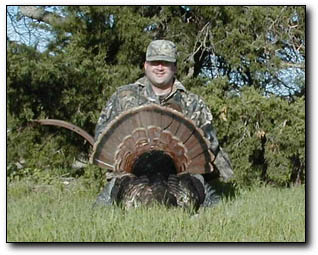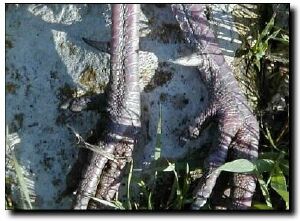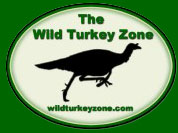|
 Many
times as a turkey hunter your best
hunts are those where you try something
different and you end up learning
a new technique. I had been hunting
a new location this year just for
a different challenge. I had called
in several 2 year olds and a bunch
of jakes but I was still holding out
for the boss gobblers that I knew
were around. Many
times as a turkey hunter your best
hunts are those where you try something
different and you end up learning
a new technique. I had been hunting
a new location this year just for
a different challenge. I had called
in several 2 year olds and a bunch
of jakes but I was still holding out
for the boss gobblers that I knew
were around.
I had arrived at the
farm a little late with a hunting
buddy of mine and we go started up
the hill behind the farmer's barn
about 5:45 or so and the birds started
gobbling about 6:00 a.m.. We were
trying to get down into the bottom
of this ravine and set up on this
grassy opening I had seen birds on
before. We were on our way down when
a bird gobbled right across the ravine
from us about 75 yards away. Since
we were in a decent location and I
wasn't sure we could circle the bird
and get up on his level, we set up
right there on the flat in the ravine's
bottom and tried to call him in.
Hindsight is always 20/20 and after
a tree full of hens started chiming
in I knew we were probably out of
luck there unless I could call the
hens in also. I tried with a lot of
aggressive calling and it worked to
some extent since we had 2 of the
hens come our way but there were at
least 10 more that just dropped out
of the tree on the ridge and worked
their way west along the top. I decided
to move on by myself about 7:30 a.m.
and go to another strut zone where
I had tried to shoot a bird the previous
time we had gone out.
 This
farm is a typical Flint Hills farm/ranch
where you have a wooded creek bottom
with corn, wheat and bean fields in
the bottom ground and many wooded
gulleys or ravines leading up into
the pastures. The tops of the hills
and most of the wider valleys are
bare grass. This particular farm has
a series of gulleys that run anywhere
from 1/2 mile to 1 mile back up into
the pastures. This
farm is a typical Flint Hills farm/ranch
where you have a wooded creek bottom
with corn, wheat and bean fields in
the bottom ground and many wooded
gulleys or ravines leading up into
the pastures. The tops of the hills
and most of the wider valleys are
bare grass. This particular farm has
a series of gulleys that run anywhere
from 1/2 mile to 1 mile back up into
the pastures.
I was going over to
the next gulley to the south and I
quickly got there and began working
my way below the ridge to a prime
strutting location to the west. I
had seen some birds about 3/4 mile
away up on the hill to the west so
I wanted to stay down out of sight.
I made my way to the strut area, circled
around it and came up a row of trees
on its west side. I had seen this
longbeard previously working this
area around the shoulder of a hill.
There was also a spring fed stock
tank there and a lot of green grass.
I started yelping on my American Friction
Cut-n-Paddle box. I didn't hear anything
at first and then after a few minutes
I tried again with some cutting mixed
in and good loud cackle. I thought
I heard a gobble to the northeast,
which is where I expected the bird
to be.
I turned that direction
and waited awhile longer and yelped
some more. This time I heard a gobble
but it came from the west. I got turned
around again and confirmed it with
some cutting. There was a bird that
was down to the southwest of me but
he was working his way north and east
towards me. I stopped calling for
awhile and tried him one more time.
This time he gobbled back a lot closer
and he was coming from the NW. I shifted
to cover that area and right after
that he comes in walking and half-strutting
his way across the grass.
This boy was on the
move and going diagonally across in
front of me. It looked like the huge
bird I had seen strutting there previously
and he was working directly towards
the strut area. I needed to stop him
so I clucked and he stopped and lifted
his head up. I shot him and he folded.
 This
was a really nice old bird with sharp
1 5/16" spurs, which were pink
with black tips. He was also one of
the most vocal birds I've ever called
in since he came from about 1/2 mile
away and gobbled all of the way up
to his last step. I was really impressed
with the Cut-n-Paddle I was using.
This was my first season using this
call and it was amazing the response
I was getting on birds, especially
while locating birds at long distances. This
was a really nice old bird with sharp
1 5/16" spurs, which were pink
with black tips. He was also one of
the most vocal birds I've ever called
in since he came from about 1/2 mile
away and gobbled all of the way up
to his last step. I was really impressed
with the Cut-n-Paddle I was using.
This was my first season using this
call and it was amazing the response
I was getting on birds, especially
while locating birds at long distances.
|

